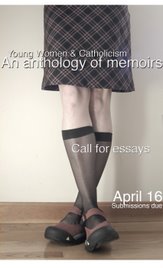 In Masses that I have attended this particular 28th Sunday in Ordinary Time , the priest or deacon serving as homilist has often offered a catechismic interpretation on these readings, following an argument that the Church as divine institution knows the secret of being well-fed: place ultimate trust in God, that through God alone, all persons will be cared for. As a hearer of these homilies I have walked away with the following principle: to be fit to receive to the Eucharist, the bread of life, ensures that you will be prepared enter the feast of the Kingdom of God. One becomes fit by being content with the church as it is. Fit by making yourself ready to receive the Eucharist, confessing sins great and small to receive absolution on Saturday afternoon from the rector or monsignor. Fit by wearing clothing appropriate to mass. Fit by kneeling at the appropriate times. Fit by adoring those bells that still ring at many diocesan parishes at the point of epiclesis, moment of the Holy Spirit's descent. It feels like familiar territory where ordained clergy, also all male, lest we forget, proclaim that receiving the Eucharist, adoring the Eucharist, with the hope of the forgiveness of my sins--for only venial sins are forgiven with my contrition and reception--will bring more me fully into the Kingdom of God. Credo. Yes, I believe.
In Masses that I have attended this particular 28th Sunday in Ordinary Time , the priest or deacon serving as homilist has often offered a catechismic interpretation on these readings, following an argument that the Church as divine institution knows the secret of being well-fed: place ultimate trust in God, that through God alone, all persons will be cared for. As a hearer of these homilies I have walked away with the following principle: to be fit to receive to the Eucharist, the bread of life, ensures that you will be prepared enter the feast of the Kingdom of God. One becomes fit by being content with the church as it is. Fit by making yourself ready to receive the Eucharist, confessing sins great and small to receive absolution on Saturday afternoon from the rector or monsignor. Fit by wearing clothing appropriate to mass. Fit by kneeling at the appropriate times. Fit by adoring those bells that still ring at many diocesan parishes at the point of epiclesis, moment of the Holy Spirit's descent. It feels like familiar territory where ordained clergy, also all male, lest we forget, proclaim that receiving the Eucharist, adoring the Eucharist, with the hope of the forgiveness of my sins--for only venial sins are forgiven with my contrition and reception--will bring more me fully into the Kingdom of God. Credo. Yes, I believe. But I don't want to be merely penetrated by the idea of my lack, my lack as a female, a layperson, one who must pray and hope for my own redemption. The kin-dom beckons us to believe in something more than what is conveyed in the homilies I’ve heard on this Sunday at diocesan parishes. I don't know what that something more is exactly, but, Credo, I believe that is has to do something about not only taking Jesus, the Eucharist as the bread of life, into our being, but believing that somehow we are enough with or without reception of the Eucharist. Unsought for abundance is the central theme of the readings. Wine overflows; oil overflows; Paul is full; the banquet table is laden with food. How then is a theology of abundance subverted in a theology of proper observation of the Eucharist?
"My friend, how is it that you came in here without a wedding garment?"
And she was reduced to silence.
The king said to his attendants,
"Bind her hands and feet, and cast her out into the darkness."
Many are invited. Few are chosen.
These words are the oft neglected part of the reading for this week. They do not fit neatly into the storyline. The king has invited anyone who can be found in the street to celebrate his son's wedding. "Come to the feast!", the servants call, gathering good and bad alike. The hall is full. But the king spots someone with no wedding garment. She is cast out. Commentaries note how wedding garments may just have meant clean clothes and that for an individual to be invited, not despite, but regardless of last minute invitations, and to arrive in soiled garments would be an insult to the host. Who do we truly insult with our dirt and soil, sweat and shame? Is it the God beyond God who will destroy the veil that veils all peoples or those who walk about the hall filled with guests?
In addition to preparing for doctoral exams in religion, Kate Lassiter farms with friends in Nashville, Tennessee, where they know what it means to be both well-fed and overwhelmed by the amount of fresh produce to can, dehydrate, and process during the growing season. She can be reached at kate.lassiter@vanderbilt.edu.



No comments:
Post a Comment